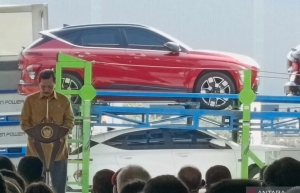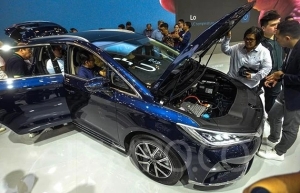Electric vehicle development must be encouraged
 |
| Dam Hoang Phuc, director, Automotive Engineering Programme, Hanoi University of Science and Technology |
Shifting to EVs not only cuts greenhouse gas (GHG) emissions, but also advances automotive technology. Electrification is becoming a preferred solution and is expected to gradually replace vehicles with internal combustion engines.
These vehicles fall into two main categories: hybrid and pure electric. Hybrid vehicles use both internal combustion engines and electric motors, whereas pure EVs rely solely on electric motors. Pure EVs emit no direct pollutants, making them effective in reducing air pollution.
EVs, particularly hybrids and pure electric models, represent the future of global transportation. Vietnam must increase investment in research and application of these technologies. Currently, EVs are among the most-discussed green transportation options.
In 2022, a programme was approved for the green energy transition to reduce carbon and methane emissions in the transport sector. The primary aim is to create a green transport system to achieve net-zero GHG emissions in Vietnam by 2050. Similar goals are set by others in the region, including Brunei, Cambodia, Laos, Malaysia, and Singapore, while Indonesia targets net-zero by 2060.
Last month, the Ministry of Transport issued a plan to reduce GHG emissions in the transport sector by 2030. The plan outlines preferential policies, which aims for e-cars to account for 30 per cent of total cars and e-motorbikes 22 per cent of total motorbikes by 2030. Charging stations will be installed at highway and national highway rest stops, enabling greener infrastructure access, though this will require local infrastructure investments.
So as to achieve these goals, the ministry will review and enhance policy mechanisms related to vehicle classification and infrastructure investment for EVs. The plan also seeks to expand electric bus networks in major cities, promoting public transport.
Integrating EVs necessitates considering power sources, grid capacity, charging stations, and battery recycling systems. Each province’s power system must be carefully planned to support economic and social development goals, factoring in the infrastructure needs for EV growth.
Since 2020, Vietnam’s move towards EV development has accelerated, with many manufacturers launching EV models across various price points. At the Vietnam Motor Show 2024, green vehicles, including models like the Toyota Camry HEV, Honda Civic, Suzuki XL7 Hybrid, and BYD’s pure electric series, showed growing consumer interest.
Globally, major markets such as Europe, the US, Japan, and China are heavily supporting EV adoption through incentives like tax reductions, subsidies, and free charging services. In Southeast Asia, Thailand and Indonesia offer tax and registration fee exemptions for EVs.
Vietnam can draw from international experience to encourage EV development. For instance, Thailand offers a special consumption tax 17-27 per cent lower for hybrids than traditional vehicles, while Indonesia provides incentives of 8-40 per cent.
 | Indonesia aims to become key chain in global EV industry Indonesian officials have emphasised the importance of developing downstream industries, particularly in electric vehicle (EV) battery production, to enhance the country's economic value. |
 | Hyundai Mobis signs investment agreement with Slovak government to establish new electrification plant Hyundai Mobis, is expanding its electrification business for global automakers by establishing an additional production base for crucial electric vehicle (EV) components in Europe |
 | Chinese electric vehicle maker to build plant in Indonesia China's leading electric vehicle maker PT BYD Motor plans to invest 11,700 billion IDR (754 million USD) to build a plant with a capacity of 150,000 units of electric vehicles (EVs) per year in Indonesia, a local official said on October 16. |
What the stars mean:
★ Poor ★ ★ Promising ★★★ Good ★★★★ Very good ★★★★★ Exceptional
Related Contents
Latest News
More News
- A golden time to shine within ASEAN (February 19, 2026 | 20:22)
- Vietnam’s pivotal year for advancing sustainability (February 19, 2026 | 08:44)
- Strengthening the core role of industry and trade (February 19, 2026 | 08:35)
- Future orientations for healthcare improvements (February 19, 2026 | 08:29)
- Infrastructure orientations suitable for a new chapter (February 19, 2026 | 08:15)
- Innovation breakthroughs that can elevate the nation (February 19, 2026 | 08:08)
- ABB Robotics hosts SOMA Value Provider Conference in Vietnam (February 19, 2026 | 08:00)
- Entire financial sector steps firmly into a new spring (February 17, 2026 | 13:40)
- Digital security fundamental for better and faster decision-making (February 13, 2026 | 10:50)
- Aircraft makers urge out-the-box thinking (February 13, 2026 | 10:39)

 Tag:
Tag:













 Mobile Version
Mobile Version